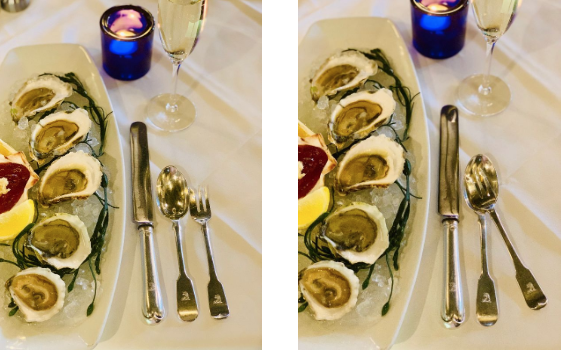An oyster fork is the only fork placed on the right side of a plate, and it is the furthest away from the plate, as it sits to the right of the soup spoon. It may also be placed with the tines resting on the spoon, slightly askew to the rest of the perfectly aligned flatware! My sincere appreciation to Oyster Chef Francisco for shucking the fresh, delectable oysters, courtesy of the fabulous Max Oyster Bar in West Hartford, Connecticut!
Aligning your flatware on a table is a detail that is often overlooked. The traditional rule of thumb is to have the bottom handle of each piece of flatware line up perfectly alongside each other. They are to rest approximately 1" to 1 1/2" from the edge of the dining room table, and never more than 2". Occasionally, you may see the top of each piece of flatware lined up instead of the bottom handles. The only piece of flatware that can be askew is the oyster fork!
In royal households, the butler is most serious about the accuracy of aligning flatware, often using a measuring device. When using a table cloth, I use a 1" ruler to align the flatware from the edge of the table. If there is an inlaid wood design on a table, it too can serve as the guideline for placing your flatware evenly. I use the blade of a dinner knife, which is 3/4" wide, to align my flatware from the edge of the placemat.
Sign up for Mummy’s Monday Manners to receive new sparkling tips about etiquette and classic design every week, along with a free download of Holly’s Elegant Entertaining e-book.
Using a dinner knife blade as your guide makes it simple to align your flatware!
Forbidden Faux Pas
No-no: To have a spoon present when it is not required for anything on the menu being served.
No-no: To place a fork upon a napkin, unless it is outside on a windy day.
No-no: To have knife blades facing away from the plate.
What is done: Knives are placed to the right of the plate and the knife blade will face towards the plate. This is to protect you from cutting yourself as you pick up the knife with your right hand.
Millennial Tip
It is a French custom, often observed in Europe and America, to place forks on the table with the tines facing down, versus upwards. This is especially lovely for flatware which features engraved initials or a monogram, or to display the embellished design on the backside of flatware, such as Tiffany's Chrysanthemum pattern.


